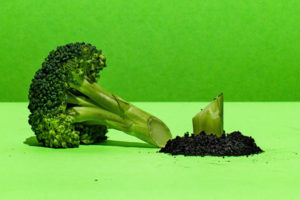This spring, three major reports came out telling us that if we don’t change our ways soon, we’re looking at a pretty bleak future. The Intergovernmental Panel on Climate Change (IPCC) (1), the UN Food and Agriculture Organization (FAO) (2) and American Association for the Advancement of Science (3) have all just warned that global warming may do us in if we don’t take widespread action. Fast.
All of this gloomy news about the environment we depend on can make our prospects seem pretty hopeless.
But there is a silver lining to all of that news. The future hasn’t happened yet. We have the power to effect change. And it turns out that one of the most effective actions we can take to stem this crisis is also the easiest.
And, if we all do it, we can cut greenhouse gas emissions by more than if we got rid of all of the cars in the world (4, 5), and – as the IPCC report highlights – cut global warming abatement costs in half (1, 6)!
Not only that, but widespread adoption of this easy action would dramatically alleviate most of our other environmental problems, from water pollution to deforestation of the Amazon. And feed the hungry while protecting us from chronic disease.
What is it that could be so effective on so many levels? What is this simple change that every one of us has the power to make?
To accomplish all of this, all we have to do is collectively drop animal products from our diets. It’s a small and rather healthy adjustment, but it would represent a huge step towards making our lifestyles sustainable. And it would save society a fortune – money that could instead be poured into technologies that we would do well to develop – and soon. Because it takes several pounds of corn and soy to raise animals the way we do today (7, 8), growing plants for humans to eat directly is dramatically cheaper than raising animals for food. Transitioning to a plant-based diet makes both good environmental and good fiscal sense.
It would also prevent one of the more ominous predictions that the IPCC report makes – that, due to global warming, population growth and dominant eating habits, we are not going to be able to feed ourselves in the long run (1). When food gets scarce, things get scary. Contrast that with the four billion more people we could feed just by switching to a plant-based diet – yes, a comprehensive recent study showed that we could feed 4,000,000,000 more people from the same land we use today if we were to all drop animal products from our diets (9).
We need to act fast. The numbers are in, and then some.
The FAO reckoning indicates (2) that agriculture is directly responsible for about 14% of global warming gases (5.3 billion tonnes, in CO2 equivalents). Add indirect effects (i.e., deforestation and other land use changes due to agriculture) and the tonnage approaches 10 billion. That works out to roughly 25% of all the global warming gases we put out there. Of that 25% about two-thirds is due to raising animals (2) – something like 15% of the total GHGs from all sources!
A strong argument can be made that even these figures are low. Methane, belched from cows and emanating from rotting manure, is responsible for 40% of the global warming effect of animal agriculture (2). It has a lifetime in the atmosphere of less than 20 years but the IPCC and the FAO average its effects over 100 years. But really, over its lifetime, methane is roughly three times as potent as the value the IPCC and the FAO uses in their reports (1, 2, 10). Count methane’s effects over its short lifetime, and it then becomes simple to calculate that animal agriculture is directly responsible for some 20% of global warming in the here and now – better than 25% when the indirect effects are also counted.
If we were to swiftly eliminate animal agriculture, much of that methane would quickly disappear. We’d buy ourselves a fair bit of time to complete the other pressing changes that we must make if we are to thrive in the future.
Many of us are aware of the danger. We want to save our planet and everyone on it. We are slowly exploring alternatives to fossil fuels, finding ways to cut back on waste and increase sustainability in our home and workplace.
And yet diet remains an environmental blind spot for most of us.
Animal agriculture ranks as the worst, or second worst, offender on most environmental measures (11-14). Whether it be air pollution, water pollution and depletion, deforestation, land degradation or deforestation, animal agriculture is right up there. Animal-heavy diets are a major culprit in far too many climate crimes.
Plus, it steals food from those least able to feed themselves.
Because most of what animals eat is used for their metabolism or ends up as manure, it takes on average six pounds of plant protein to produce a single pound of animal protein. Producing all of the grain and soy needed to raise enough animals for food puts upward pressure on the price of those staples, pricing them out of the range of the world’s poor. Indeed, rising meat consumption is thought to be largely responsible for the food crises that have recently rocked many of the poorer countries in the world (15).
And, of course, that so much extra grain must be grown just to feed animals means that we’re amplifying the amount of land and water needed – and the amount of soil degraded and water tables depleted, etc., etc. – to feed the world. As many well-informed scientists are saying, if we’re going to live in a sustainable world, we’re pretty much going to have to stop eating animals (7, 15-17).
It is unfortunate that trends on all of the things we need to change are heading in the opposite direction (1-3, 15, 19-21). This has to change, and it can. Changing our diets is easy, and results in multiple positive benefits.
The stakes are huge (20, 21). Famed author Jared Diamond puts the odds of civilization surviving the next century at little better than 50-50 (22). So now is the time to act. It really is a matter of life and death. For the planet, and every one of its inhabitants.
Change your diet. Encourage your friends. And most especially; lobby your governments.
There is light shining through the gloom. Desmond Tutu is calling for a boycott of energy companies that do not move into renewables (24). The price of solar panels is rapidly dropping. And the easiest and perhaps biggest personal step we can all take – dropping animal products from our diets – is becoming ever more popular (25). Let’s work hard to make this the new normal. Our future depends on it.
David Steele is a recently retired Research Scientist in the faculty of medicine at UBC. He holds a Ph.D. in Genetics and Molecular Biology from Emory University, in Atlanta. Dave is also the current president of Earthsave Canada.
References
1. Climate Change 2014: Mitigation of Climate Change (Draft Report) Intergovernmental Panel on Climate Change, Geneva:United Nations IPCC, 2014 http://mitigation2014.org/report/final-draft/
2. Tubiello, F.N., et al. Agriculture, Forestry and Other Land Use Emissions by Sources and Removals by Sinks – 1990 to 2011 Analysis, United Nations FAO, 2014 http://www.fao.org/docrep/019/i3671e/i3671e.pdf
3. What We Know. Washington: American Association for the Advancement of Science, 2014 http://whatweknow.aaas.org/
4. Livestock’s Long Shadow. United Nations FAO, 2006 ftp://ftp.fao.org/docrep/fao/010/a0701e/a0701e.pdf
5. Koneswaran, G. and Nierenberg, D. Global Farm Animal Production and Global Warming: Impacting and Mitigating Climate Change. Environmental Health Perspectives 116:578-582, 2008. http://www.ncbi.nlm.nih.gov/pmc/articles/PMC2367646/
6. Stehfest E., et al. Climate benefits of changing diet. Climatic Change 95 83–102, 2009. http://dels.nas.edu/resources/static-assets/banr/AnimalProductionMaterials/StehfestClimate.pdf
7. Pimentel, D. and Pimentel, M. Sustainability of meat-based and plant-based diets and the environment. American Journal of Clinical Nutrition 78:660S-663S, 2003. http://ajcn.nutrition.org/content/78/3/660S.full.pdf
8. Smil, V. Energy in Nature and Society: General Energetics of Complex Systems. Cambridge, MA: MIT Press, 2008
9. Cassidy, E.S., et al. Redefining agricultural yields: from tonnes to people nourished per hectare. Environmental Research Letters 8:034015, 2013 http://iopscience.iop.org/1748-9326/8/3/034015/article
10. Climate Change 2007: Working Group I: The Physical Science Basis. Geneva:United Nations IPCC, 2007 http://www.ipcc.ch/publications_and_data/ar4/wg1/en/ch2s2-10-2.html
11. Hamershlag, K. What you eat matters. Environmental Working Group, 2011. http://www.ewg.org/meateatersguide/a-meat-eaters-guide-to-climate-change-health-what-you-eat-matters/
12. Roos, E., et al. Can carbon footprint serve as an indicator of the environmental impact of meat production? Ecological Indicators 24:573-581, 2013. http://www.sciencedirect.com/science/article/pii/S1470160X12002956
13. Westhoek, H., et al., Food choices, health and environment: Effects of cutting Europe’s meat and dairy intake. Global Environmental Change, in press. http://www.sciencedirect.com/science/article/pii/S0959378014000338
14. Jägerskog, A. and Jønch Clausen, T. (eds.). Feeding a Thirsty World – Challenges and Opportunities for a Water and Food Secure Future. Report Nr. 31. SIWI, Stockholm, 2012. http://www.siwi.org/documents/Resources/Reports/Feeding_a_thirsty_world_2012worldwaterweek_report_31.pdf
15. Weis, T. The meat of the global food crisis. Journal of Peasant Studies 40:65-85 , 2013. http://www.yale.edu/agrarianstudies/foodsovereignty/pprs/Weis%202013.pdf
16. Vidal, J. Food shortages could force world into vegetarianism, warn scientists. The Guardian (London) Aug. 26, 2012 http://www.theguardian.com/global-development/2012/aug/26/food-shortages-world-vegetarianism
17. UN Environment Programme, 2012. Avoiding Future Famines: Strengthening the Ecological Foundation of Food Security through Sustainable Food Systems. Nairobi, 2012 http://www.unep.org/publications/ebooks/avoidingfamines/portals/19/UNEP_Food_Security_Report.pdf
18. Goldenberg, S. UN: rate of emissions growth nearly doubled in first decade of 21st century The Guardian (London) April 11, 2014. http://www.theguardian.com/environment/2014/apr/11/un-greenhouse-gas-emissions-doubled-decade-ipcc-report
19. Ecowatch. UN Predicts 30% Rise in Agriculture’s Greenhouse Gas Emissions by 2050. April 11, 2014 http://ecowatch.com/2014/04/11/agricultures-greenhouse-gas-emissions-2050/
20. Zielinski, S. Five Frightening Observations From the Latest International Climate Change Report. Smithsonian Magazine. March 31, 2014 http://www.smithsonianmag.com/science-nature/five-frightening-observations-latest-international-report-climate-change-180950330/?no-ist
21. Morrison, S. Leaked climate change report: Scientific body warns of ‘devastating rise of 4-5C if we carry on as we are’. The Independent (London). April 13, 2014. http://www.independent.co.uk/environment/climate-change/leaked-climate-change-report-scientific-body-warns-of-devastating-rise-of-45c-if-we-carry-on-as-we-are-9256708.html
22. Diamond, J., et al. We Could Be Living in a New Stone Age by 2114. Mother Jones Magazine. April 18, 2014 http://www.motherjones.com/environment/2014/04/jared-diamond-inquiring-minds-humanity-survival
23. Carrington, D. Desmond Tutu calls for anti-apartheid style boycott of fossil fuel industry. The Guardian (London). April 10, 2014. http://www.theguardian.com/environment/2014/apr/10/desmond-tutu-anti-apartheid-style-boycott-fossil-fuel-industry
24. Cleantechnica. Cost Of Solar Power 60% Lower Than Early 2011 In US. Sept. 19, 2013. http://cleantechnica.com/2013/09/19/cost-solar-power-60-lower-early-2011-us/
25. Haupt, A. Me, Give Up Meat? Vegan Diets Surging in Popularity. U.S. News and World Report. July 24, 2012. http://health.usnews.com/health-news/articles/2012/07/24/me-give-up-meat-vegan-diets-surging-in-popularity
Photo by Sebastian Molina fotografía on Unsplash




